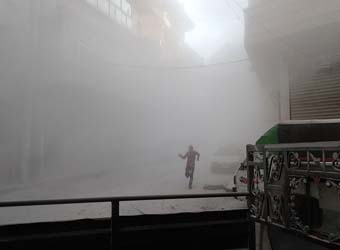Russia, Iran, and Turkey will post observers on the edge of a de-escalation zone in northern Syria’s Idlib region largely controlled by Islamist militants, the three nations said on Friday.
The move is part of a broader plan under which Moscow, Tehran and Ankara will set up four such zones in different parts of Syria, an idea described by critics as de facto partitioning of the war-torn nation.
While they hailed the agreement as a breakthrough after months of talks, Moscow, Tehran and Ankara provided very few details and said some issues were still to be worked out.
They denied charges of aiming to partition the country, however, saying the zones where they plan to deploy forces would be temporary, although they could be extended beyond an initial six-month term.
A top aide to President Bashar al-Assad, Bouthaina Shaaban, said attempts to divide Syria had failed, and reiterated the government’s vow to take back the entire country, including “Idlib and other areas”. Turkey’s foreign ministry and Russian and Iranian diplomats who attended trilateral talks in Kazakhstan said on Friday their observers would be stationed in “safe zones” along the border of the Idlib de-escalation area.
Turkey’s foreign ministry and Russian and Iranian diplomats who attended trilateral talks in Kazakhstan said on Friday their observers would be stationed in “safe zones” along the border of the Idlib de-escalation area.
The Turkish ministry said in a statement the observers’ mission will be to prevent clashes between “the (Syrian) regime and the opposition forces, and any violations of the truce”.
Russian negotiator Alexander Lavrentyev said the trio will each send about 500 observers to
Idlib, and the Russians will be military policemen.
Idlib province, in northwest Syria on the border with Turkey, is largely controlled by a rebel alliance spearheaded by the former al Qaeda offshoot Nusra Front.
One analyst was unsure how effective the deal would be.
“I‘m not sure what this deal means in practice or how or if it is going to get implemented on the ground,” said Aron Lund, a Syria specialist and fellow at The Century Foundation
“The obvious stumbling block is the fact that much of Idlib is under the control of Tahrir al-Sham, which is viewed internationally as a terrorist group.”
A deal with Russia and Iran, which support President Bashar Assad’s government, marks a shift in the policy of Ankara, which backs some of the rebels and raised objections to Russia and Iran’s proposals at a previous meeting in July.
But the details of the plan remained unclear as the three countries did not make public any of the documents agreed on Friday apart from their joint statement.
Russia’s Lavrentyev said that the exact deployment locations of de-escalation control forces in Idlib had yet to be determined.
Yezid Sayigh, a senior fellow at the Carnegie Middle East Centre, said the agreement could pave way for an offensive against Hay‘at Tahrir al-Sham (HTS).
“The calls to form a ‘unified opposition army’ in the northwest under the aegis of groups close to the Muslim Brotherhood suggest that Turkey is preparing a proxy force to move against HTS in western Aleppo and Idlib: as in al-Bab and Jarablus, Turkish units would support opposition forces from behind,” he said.
A Western diplomat said it was “still unclear what the final outcome will be, notwithstanding there was just a closing ceremony”.
“How much devil will be in the detail remains to be seen,” the diplomat said.
Meanwhile, the Astana trio have started discussing setting up national reconciliation committees in Syria and will continue those discussions in late October, Lavrentyev said.
The United Nations, which hosts separate Syria peace talks in Geneva, has previously urged Astana to focus on consolidating the ceasefire and avoid political matters.
Source: Reuters
